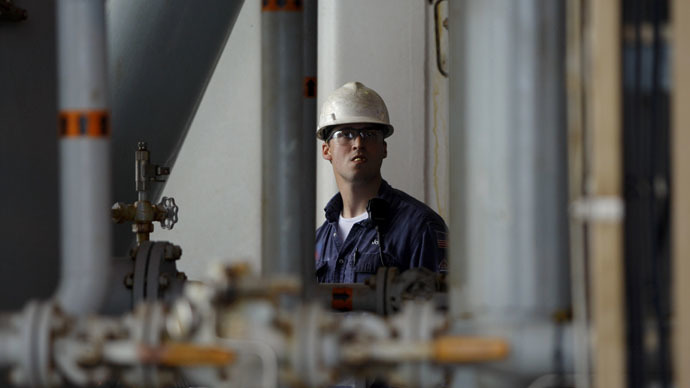Methane leaks cancel climate benefits of natural gas use, cost taxpayers millions – report

So much methane leaks from oil and gas production on federal and tribal lands in the United States that any environmental benefits gained from natural gas use are cancelled out. It also costs US taxpayers tens of millions of dollars in royalties.
Some 65 billion cubic feet of natural gas leaked into the atmosphere from oil and gas operations on federal and tribal lands within the United States in 2013 alone, a new report commissioned by the Environmental Defense Fund (EDF) found. About 47 billion cubic feet (Bcf) of that leaked from projects on federal lands, while 18 Bcf came from tribal lands.
All told, that amounts to roughly 1 million metric tons of methane released in just one year, according to ThinkProgress, or the equivalent of the emissions from more than 5 million cars.
The report, conducted by the ICF International consulting group, stated that the majority of the emissions escaped during the gas production process.
READ MORE: Companies must disclose fracking chemicals on public lands - Obama admin
Moreover, since royalty payments are supposed to be made to the government for gas collected on federal lands, the leaks are not only harming the environment, but depriving taxpayers of income. The total worth of gas lost due to leaks amounted to some $360 million in 2013, with the report estimating that $31 million of that would have gone to the states and the federal government.
“Every molecule of methane that’s being leaked or flared is a molecule that’s not having royalty assessed on it,” Jon Goldstein, a senior energy policy manager at EDF, said to ThinkProgress. “Those royalties are what you use to return to states and tribes to invest in schools, to invest in roads — things that really help impacted communities.”
While burning natural gas releases fewer greenhouse gases than burning coal, that benefit can only be realized if methane leaks are minimized. Methane itself is about 84 times more efficient at shutting in heat than carbon dioxide, so gathering oil and gas with minimal leakage into the atmosphere is a top priority for environmentalists.
According to the Guardian, in order for the use of natural gas to be beneficial in battling greenhouse effects, less than 3 percent can be leaked. The EDF report indicates that currently 2.2 percent is being leaked, and that number could easily approach 3 percent if estimates were to take into account leaks beyond drilling sites, Hugh MacMillan of the Food and Water Watch nonprofit told the Guardian
“Natural gas can be a net climate benefit, if we demand the most efficient production and development processes as possible,” Dan Grossman, the EDF’s Rocky Mountain regional director, told High Country News.
READ MORE: Fracking to blame? Alabama earthquakes occurring near shale-gas developments
Both the Environmental Protection Agency and the Bureau of Land Management are looking into proposals to reduce methane emissions.
According to High Country News, tighter regulations are something the oil industry should not necessarily be set against, since companies would have more gas to sell if methane leaks were cut. Still, Howard Feldman of the American Petroleum Institute, which represents oil and gas companies, seemed to dismiss the idea that more regulations were necessary.
“Companies already are incentivized to reduce these emissions,” Feldman said. “Many companies are taking these approaches. Not all. The vast majority of production is coming from companies already taking these measures.”












